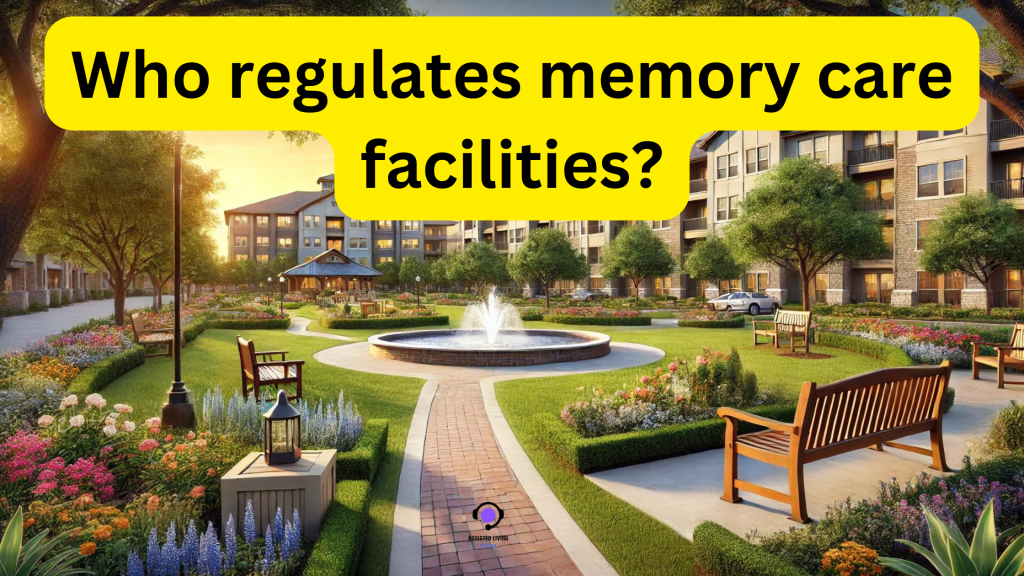
Who Regulates Memory Care Facilities?
Memory care facilities provide specialized support for individuals with Alzheimer’s, dementia, and other memory-related conditions. Given the vulnerable nature of the residents, it is crucial that these facilities operate under strict regulations to ensure their safety and quality of care. But who regulates memory care facilities, and what do these regulations entail? This article will explore the organizations, laws, and standards that oversee memory care facilities to help you make informed decisions.
Federal Regulations for Memory Care Facilities
The federal government plays an essential role in overseeing various aspects of senior care, but it does not directly regulate all memory care facilities. However, specific federal laws and guidelines impact these facilities:
- Centers for Medicare & Medicaid Services (CMS)
CMS ensures that any memory care facility that receives federal funding adheres to quality care standards. This includes regulations tied to safety, resident rights, and general healthcare practices. (Learn more about CMS) - The Americans with Disabilities Act (ADA)
Memory care facilities must comply with the ADA to ensure accessibility for residents with disabilities. This ensures that residents receive the proper accommodations needed for daily living and care. (Read the ADA regulations) - Health Insurance Portability and Accountability Act (HIPAA)
HIPAA regulations require facilities to maintain the confidentiality and security of resident medical records and personal health information. (HIPAA guidelines)
State Regulations for Memory Care Facilities
Understanding who regulates memory care facilities at the state level is equally important. State health departments and agencies oversee licensing, inspections, and compliance for these facilities.
- State Health Departments
Each state has its health department responsible for licensing memory care facilities. These departments conduct regular inspections to ensure compliance with state laws regarding staffing, hygiene, safety protocols, and resident care standards. (State-specific regulations) - Department of Aging and Long-Term Care Services
Many states have specific agencies focusing on long-term care services, which include memory care regulations. These agencies set minimum standards for staff training, emergency preparedness, and resident care plans.
Accreditation and Certification
In addition to government oversight, some memory care facilities seek additional accreditation from independent organizations. While not mandatory, these accreditations signal higher standards of care.
- Joint Commission
The Joint Commission offers a Gold Seal of Approval for memory care facilities that meet its rigorous standards. Achieving this accreditation is a mark of quality and commitment to continuous improvement. (Joint Commission accreditation) - CARF International
CARF (Commission on Accreditation of Rehabilitation Facilities) provides certification to memory care facilities that meet specific care standards. This accreditation helps facilities demonstrate compliance with high-quality care protocols. (CARF International)
Key Regulations and Compliance Factors
Memory care facilities must adhere to a range of regulations to operate:
- Staff Qualifications and Training: Caregivers are often required to undergo specialized training in dementia care, ensuring they understand the unique needs of residents.
- Resident Safety Measures: Facilities must implement security features such as locked doors, alarms, and secure outdoor areas to prevent residents from wandering.
- Care Plans and Documentation: Detailed care plans tailored to each resident’s needs are essential. Regular updates and documentation help meet compliance standards.
- Emergency Preparedness: Facilities must have protocols for emergency situations, including evacuation plans, disaster readiness, and medical emergencies.
How Do Inspections and Reporting Work?
Regular inspections and surprise visits by regulatory bodies ensure compliance with regulations. When violations are found, facilities may face fines, suspension of licenses, or other corrective actions. Publicly available reports provide transparency for families considering memory care options.
Who regulates memory care facilities varies depending on location and funding, but the goal remains the same: ensuring that these facilities provide safe, effective, and compassionate care. Understanding the regulatory framework can give families peace of mind that their loved ones will receive the best possible support.
Frequently Asked Questions (FAQ)
1. Are memory care facilities regulated by the federal government?
Not directly. While the federal government, through organizations like CMS, impacts facilities that receive funding, most direct regulation comes from state authorities.
2. What types of inspections do memory care facilities undergo?
Facilities are subject to regular and surprise inspections by state health departments and may also be reviewed by accrediting bodies like the Joint Commission.
3. How can I find out if a memory care facility is compliant?
Check with your state’s health department or long-term care ombudsman for inspection reports. Accreditation bodies also provide information on compliant facilities.
4. What should I look for when choosing a memory care facility?
Look for proper licensing, trained staff, safety measures, clear care plans, and accreditations like those from the Joint Commission or CARF.
Final Thoughts
Memory care is an essential service that requires stringent oversight to protect the well-being of residents. From federal laws to state-specific regulations, understanding who regulates memory care facilities can help families make more informed decisions when choosing a facility for their loved ones. Prioritizing accredited and compliant facilities is crucial for ensuring high-quality care and peace of mind.
- assisted living wichita falls tx
- Assisted Living Huntsville Tx
- Assisted Living Kilgore Tx
- Assisted Living Mesquite Tx
- `Assisted Living Gilmer TX

Comments